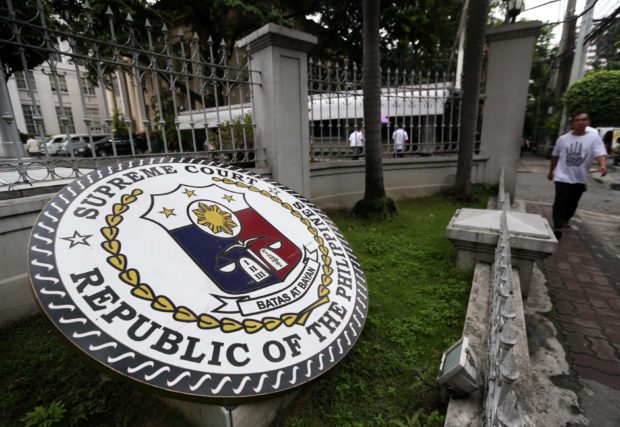
MANILA, Philippines – The Supreme Court on Monday said it has denied a petition filed by the Senate challenging the constitutionality of a 2021 memorandum by then-President Rodrigo Duterte ordering executive department officials and employees to skip legislative hearings on the government’s disbursement of COVID-19 funds.
In a 22-page decision promulgated in July last year but was only made public on Monday, the high court junked the petition for certiorari and prohibition filed by the Senate against Malacañang’s October 2021 memorandum issued by Duterte through then Executive Secretary Salvador Medialdea.
The Supreme Court en banc ruled that the Senate should follow its own rules in resolving committee jurisdictional challenges.
“To maintain the separation of powers between the three departments of the government, the court cannot exercise a power that belongs to the Senate blue ribbon committee,” it said in a statement summarizing the decision.
“All told, the court is constrained to dismiss the petition for having been prematurely filed. Unless and until the Senate has resolved with finality the jurisdictional challenge of the President, there can be no actual case or controversy to speak of yet,” the Supreme Court added.
Senate committee’s remedy
In 2021, the Senate committee started an investigation following a Commission on Audit (COA) report flagging “deficiencies” in the Department of Health’s (DOH) use of its pandemic funds worth more than P67 billion.
The blue ribbon panel then conducted hearings on the issues raised by the COA, including the DOH’s underutilization of its 2020 budget; the procurement of COVID-19 vaccines by local government units; and unspent funds, misstatements, irregularities, and deficiencies of the DOH, among others.
The hearings were attended by the concerned officials from the executive department, including then Health Secretary Francisco Duque III.
However, executive officials stopped attending the hearings after Duterte issued the memorandum, which asserted that the Senate inquiry has stepped into the mandates of other branches of government.
Viewing the memorandum as an obstruction to the Senate’s constitutional function to conduct inquiries in aid of legislation, Senate Resolution No. 131 was passed, authorizing the filing of the petition before the high court.
Senators formally filed a petition questioning Duterte’s order for executive department officers and workers to refrain from participating in legislative inquiries by the Senate committee.
In an 81-page suit dated Nov. 10, 2021, the petitioners led by then-Senate President Vicente Sotto III asked the Supreme Court to declare the memorandum of Medialdea dated Oct. 4, 2021, as “ultra vires” (beyond the powers) and asked the tribunal to prohibit him “from issuing any directives to officials and members of the executive to ignore and/or refuse to comply with orders from the Senate.”
The petitioners said the memorandum deprived the people of their right to information on matters of public concern.
No actual case
In denying the Senate’s petition, the Supreme Court found that it failed to meet the requisites for a petition for certiorari to prosper, noting that the Senate committee itself has a remedy within its office to resolve the jurisdictional challenge raised by Duterte in the memorandum.
The high tribunal cited Section 3 of the Rules of Procedure Governing Inquiries in Aid of Legislation, which states that “if the jurisdiction of the committee is challenged on any ground, the said issue must first be resolved by the committee before proceeding with the inquiry.”
“To be sure, the court cannot exercise the power on behalf of the blue ribbon committee of the Senate lest the sacred principle of separation of powers where mutual respect by and between the three departments of the government be unduly violated,” the Supreme Court pointed out.
With respect to the Senate’s own rules, the high court thus deferred to the remedy found in the Senate Rules, which effectively prohibits a premature resort to the petition filed in the Supreme Court.
The court further ruled that there was no actual case or controversy ripe for judicial adjudication.
“There is no immediate or threatened injury to the power of the Senate because it has yet to exercise the same. Hence, we still cannot tell whether this power, despite its proper exercise, has been disobeyed by the President as a result of his memorandum,” held the court.
“Unless and until the Senate has resolved with finality the jurisdictional challenge of the President, there can be no actual case or controversy to speak of yet,” the high court added.

